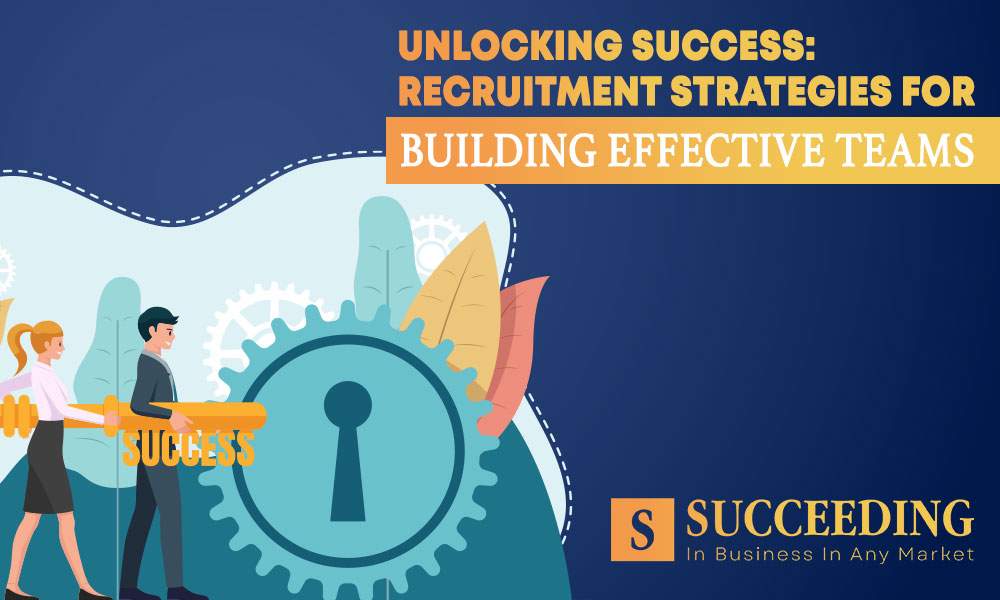Post Date: May 6, 2024

In the fast-paced and dynamic landscape of today’s organizations, the success of any venture hinges significantly on the effectiveness of its teams. In this article, we embark on a journey to unravel the intricacies of recruitment strategies—key drivers that shape and mold teams into the powerful engines of success that organizations strive for.
1: The Importance of Effective Team Building
- Defining Team Effectiveness: Effective team building goes beyond assembling individuals; it’s about creating a collective force that propels an organization toward its goals. The synergy of a well-built team fosters innovation, collaboration, and a positive workplace culture.
- Linking Recruitment to Team Success: Recruitment serves as the cornerstone of team success. It’s the strategic process of identifying, attracting, and selecting top talent that aligns with the organization’s objectives and team dynamics.
2: Understanding Key Components of Effective Recruitment
- Identifying Talent Needs: Tailoring recruitment strategies to the specific needs of a team is paramount. This involves a thorough understanding of the skills, expertise, and cultural fit required for success.
- Building a Diverse Team: Diversity is a strength. Recruitment strategies should be designed to ensure a broad range of skills, perspectives, and backgrounds, creating a rich tapestry that enhances team performance.
3: Proactive Recruitment Strategies
- Talent Pipelining: Proactive recruitment involves creating a talent pipeline—a pool of potential candidates who align with the organization’s future needs. This forward-thinking approach keeps organizations ahead in the competitive talent landscape.
- Networking and Relationship Building: Beyond job postings, recruitment extends to building relationships with potential candidates. Networking events, industry conferences, and online platforms play a crucial role in establishing connections that may bear fruit in the future.
4: Leveraging Technology in Recruitment
- Applicant Tracking Systems (ATS): ATS streamlines the recruitment process by managing candidate data, automating workflows, and improving overall efficiency. It allows recruiters to focus on building relationships and making strategic decisions.
- Utilizing Artificial Intelligence (AI): AI brings automation and data analytics to recruitment. From resume screening to candidate matching, AI tools enhance decision-making by providing valuable insights and improving the overall hiring experience.
5: Employer Branding and Recruitment Marketing
- Building a Strong Employer Brand: An organization’s reputation as an employer significantly influences its ability to attract top talent. A strong employer brand is cultivated through transparent communication, showcasing workplace culture, and highlighting employee experiences.
- Recruitment Marketing Strategies: Recruitment is evolving into a marketing endeavor. Employers actively promote their organizations as attractive employers, leveraging content, social media, and targeted campaigns to engage potential candidates.
6: Streamlining the Selection Process
- Behavioral Interviews: A cornerstone of effective recruitment, behavioral interviews delve into past behaviors as predictors of future performance. This method provides valuable insights into how candidates approach challenges and collaborate within a team.
- Assessment Tools and Tests: Objective assessment tools evaluate candidate skills, personality traits, and cultural fit. These tools enhance the selection process, ensuring that candidates not only have the right qualifications but also align with the team’s dynamics.
7: Onboarding for Team Integration
- Effective Onboarding Practices: The recruitment journey doesn’t end with hiring; it extends to the critical phase of onboarding. A structured onboarding process ensures new team members integrate seamlessly, understand their roles, and feel a sense of belonging.
- Continuous Feedback and Improvement: Ongoing feedback loops and continuous improvement are integral. Recruiters and hiring managers should gather insights from the onboarding process to refine recruitment strategies continually.

Conclusion:
In the grand tapestry of organizational success, the threads of effective recruitment strategies are intricately woven. The ability to attract, select, and integrate top talent directly impacts the strength and cohesiveness of teams, setting the stage for triumph.
1. Share Your Recruitment Success: We invite readers to share their successful recruitment strategies and experiences on our platform.
2. Explore Further Resources: For those eager to delve deeper into effective recruitment, consider exploring recommended books, articles, or workshops that provide additional insights.
FAQs on Recruitment Strategies:
Q1: Why is effective team building crucial for organizational success?
A1: Effective team building is crucial because it enhances collaboration, innovation, and overall workplace culture. High-performing teams contribute significantly to achieving strategic goals and driving business success.
Q2: How can organizations align recruitment strategies with the specific needs of their teams?
A2: Organizations can align recruitment strategies with team needs by conducting thorough talent assessments, understanding the unique skills required, and creating targeted recruitment plans. Regular communication with team leaders also helps in tailoring strategies to specific needs.
Q3: What role does technology play in modern recruitment strategies?
A3: Technology, including Applicant Tracking Systems (ATS) and Artificial Intelligence (AI), streamlines the recruitment process, automates routine tasks, and provides data-driven insights. These technologies enhance efficiency and help organizations make more informed hiring decisions.
Q4: How can organizations build a strong employer brand to attract top talent?
A4: Building a strong employer brand involves showcasing the organization’s values, culture, and commitment to employee development. Utilizing social media, creating compelling content, and highlighting employee testimonials contribute to a positive employer brand.
Q5: Why is onboarding an essential component of effective recruitment strategies?
A5: Onboarding is essential because it ensures that new hires integrate seamlessly into the team and organization. A well-structured onboarding process fosters a sense of belonging, accelerates productivity, and sets the foundation for long-term success.




